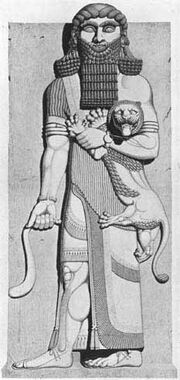
A Mesopotamian depiction of Gilgamesh
The Epic of Gilgamesh is widely accepted to be the oldest great work of literature, with some parts of the story having been written well over 4000 years ago. It follows the adventures of the Sumerian King Gilgamesh, who fears death, as he struggles to find the secret of immortality. The depiction of Gilgamesh in the Epic is a very different character to the one seen in the series.
History & Versions[]
The first legends about Gilgamesh came from several different sources and told distinct stories. These fragments - Sumerian poems dating back as far as 2100 BCE - were later incorporated into the full Epic of Gilgamesh as it is known today. The first complete version of the Epic dates back to Assyrian Mesopotamia and was written around 1200 BCE, though the complete epic may have existed in Babylonian Mesopotamia as early as 1800 BCE.
Summary[]
The Epic of Gilgamesh describes Gilgamesh as a demigod (the child of a Mesopotamian god and a mortal) and as the powerful King of Uruk (the effective capital of Sumerian Mesopotamia) who is oppressing his subjects. His people pray to the gods for an end to his oppression, so they send Endiku - a hairy, feral man - to stop his brutality. Despite a rough first meeting, they befriend one another and Gilgamesh decides they should go on a quest to slay the monstrous demigod Humbaba. Despite premonitions of disaster, they continue on their way and after a long journey and intense battle, they defeat Humbaba. Impressed, the goddess Ishtar tries to seduce Gilgamesh but he rejects her. Angered, she threatens her father until he agrees to release Gugalanna, a monstrous bull capable of near-apocalyptic devastation. Gilgamesh and Endiku slay it together, however following the victory Endiku dreams that the gods have marked him for death. After twelve days of nightmarish visions from the gods, Endiku dies, leaving Gilgamesh devastated. Full of grief and terrified he may soon meet his own fate, Gilgamesh seeks an immortal man known as Utnapishtim in an effort to learn the secret of eternal life. After a long journey and many challenges, he comes to the island where Utnapishtim lives. Utnapishtim laughs, explaining Gilgamesh is a fool to try and stop death, and that trying to do so makes life not worth living. Gilgamesh asks Utnapishtim how he became immortal, and Utnapishtim explains that when the "great flood" was sent to destroy humanity, the god Ea told him how to build a boat which would allow he, his wife, his craftsmen, and his livestock to survive. He explains that his immortality, and the immortality of his wife, was to be unique. To prove his point, Utnapishtim challenges Gilgamesh to stay awake for six days and seven nights. When Gilgamesh fails, Utnapishtim explains that if he cannot even conquer sleep, there is no chance that he will conquer death. Before Gilgamesh leaves to return to his home, Utnapishtim's wife tells Gilgamesh that there is a plant at the bottom of the sea which can restore youth. He ties stones to his feet so he can walk on the sea floor and manages to retrieve the plant, and declares he shall test its powers on an old man when he returns to his kingdom of Uruk. However, the plant is stolen by a serpent on his journey home, causing Gilgamesh to finally make peace with his mortality.
In the Series[]

Gilgamesh
The depiction of Gilgamesh in the series is dramatically different from the version of Gilgamesh in the legend. Gilgamesh was made immortal by Abraham at least 10,000 years ago (probably much earlier), while the first major Mesopotamian civilization would not appear until about 5500 years ago. With this being true, Gilgamesh's quest for immortality as described in the Epic would not correspond to the sequence of events as related in the series.
One possible explanation for the discrepancies in the story is that the story was set while Gilgamesh was still a mortal. However, this is unlikely because the story refers to an independent human civilization, which could not have existed until after the fall of Danu Talis.
The more likely explanation is that the story fragments that eventually became the Epic of Gilgamesh described multiple individuals. If true, certain sections of the story may actually describe events in Gilgamesh's past while the events that do not match were the actions of other, unnamed figures.
Trivia[]
- The Mesopotamian flood story (appearing to be a folk legend which the audience was expected to know before they heard the Epic) is the root of the Noah's Ark story which appears in the Tanakh and the Old Testament Bible.
- Based upon how the story is constructed, it is probable that Gilgamesh was a real king of Sumerian Mesopotamia, who ruled at some point between 2800 BCE and 2500 BCE.
- In the original text, the "great flood" that destroyed humanity destroyed those who were not spared by turning them into clay. This may better line up with Prometheus' creation of the Humani.